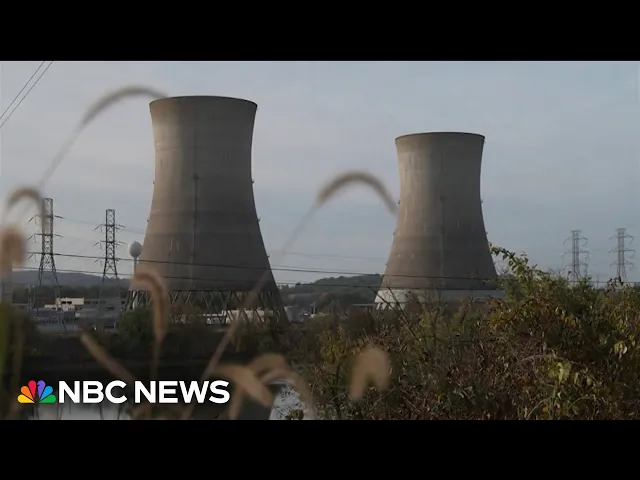Three Mile Island nuclear plant fast-tracked to reopen for AI energy demand

AI's power hunger transforms nuclear energy
The famed Three Mile Island nuclear power plant is getting a new lease on life, driven by an unlikely savior: artificial intelligence. As Microsoft announces plans to restart the facility to power its AI data centers, we're witnessing a pivotal moment in the evolving relationship between energy policy and technological innovation. The decades-dormant plant—site of America's worst nuclear accident—now stands at the crossroads of our digital future and environmental aspirations.
The announcement marks a dramatic shift in how major tech companies approach their growing energy needs. Microsoft's decision to partner with Constellation Energy to reopen Three Mile Island comes as AI development consumes unprecedented amounts of electricity. This partnership isn't just about powering chatbots—it's a signal that the energy landscape for technology is fundamentally changing.
-
The AI industry faces a critical power shortage as large language models and other advanced AI systems demand massive computing resources that traditional energy infrastructure struggles to support.
-
Nuclear power offers a carbon-free solution to AI's energy crisis, providing the reliable, high-capacity electricity generation that renewable sources like solar and wind cannot yet consistently deliver at scale.
-
The rehabilitation of Three Mile Island represents a broader trend of nuclear energy's image transformation from environmental villain to potential climate solution, with tech companies leading this perception shift.
-
Microsoft's long-term power purchase agreement marks a new model for how technology companies might secure their energy futures—directly investing in generation rather than simply purchasing credits.
Perhaps the most revealing insight from this development is how AI's voracious appetite for electricity is actually reshaping our energy priorities. The computing requirements for training and running large AI models have grown exponentially—by some estimates, a single ChatGPT query consumes about 10 times the electricity of a standard Google search. Microsoft's desperate need for reliable power has accomplished what environmental advocates couldn't: making nuclear energy economically viable again despite its high operational costs.
This matters tremendously because it reverses decades of nuclear power plant closures in the United States. Since 2013, more than a dozen reactors have been decommissioned, often due to economic pressures rather than safety concerns. The Three Mile Island restart signals that economics now favor nuclear in certain contexts—specifically, when paired with the premium that tech companies will pay for reliable, carbon-free electricity for their AI operations.
What the coverage doesn
Recent Videos
How To Earn MONEY With Images (No Bullsh*t)
Smart earnings from your image collection In today's digital economy, passive income streams have become increasingly accessible to creators with various skill sets. A recent YouTube video cuts through the hype to explore legitimate ways photographers, designers, and even casual smartphone users can monetize their image collections. The strategies outlined don't rely on unrealistic promises or complicated schemes—instead, they focus on established marketplaces with proven revenue potential for image creators. Key Points Stock photography platforms like Shutterstock, Adobe Stock, and Getty Images remain viable income sources when you understand their specific requirements and optimize your submissions accordingly. Specialized marketplaces focusing...
Oct 3, 2025New SHAPE SHIFTING AI Robot Is Freaking People Out
Liquid robots will change everything In the quiet labs of Carnegie Mellon University, scientists have created something that feels plucked from science fiction—a magnetic slime robot that can transform between liquid and solid states, slipping through tight spaces before reassembling on the other side. This technology, showcased in a recent YouTube video, represents a significant leap beyond traditional robotics into a realm where machines mimic not just animal movements, but their fundamental physical properties. While the internet might be buzzing with dystopian concerns about "shape-shifting terminators," the reality offers far more promising applications that could revolutionize medicine, rescue operations, and...
Oct 3, 2025How To Do Homeless AI Tiktok Trend (Tiktok Homeless AI Tutorial)
AI homeless trend raises ethical concerns In an era where social media trends evolve faster than we can comprehend them, TikTok's "homeless AI" trend has sparked both creative engagement and serious ethical questions. The trend, which involves using AI to transform ordinary photos into images depicting homelessness, has rapidly gained traction across the platform, with creators eagerly jumping on board to showcase their digital transformations. While the technical process is relatively straightforward, the implications of digitally "becoming homeless" for entertainment deserve careful consideration. The video tutorial provides a step-by-step guide on creating these AI-generated images, explaining how users can transform...
